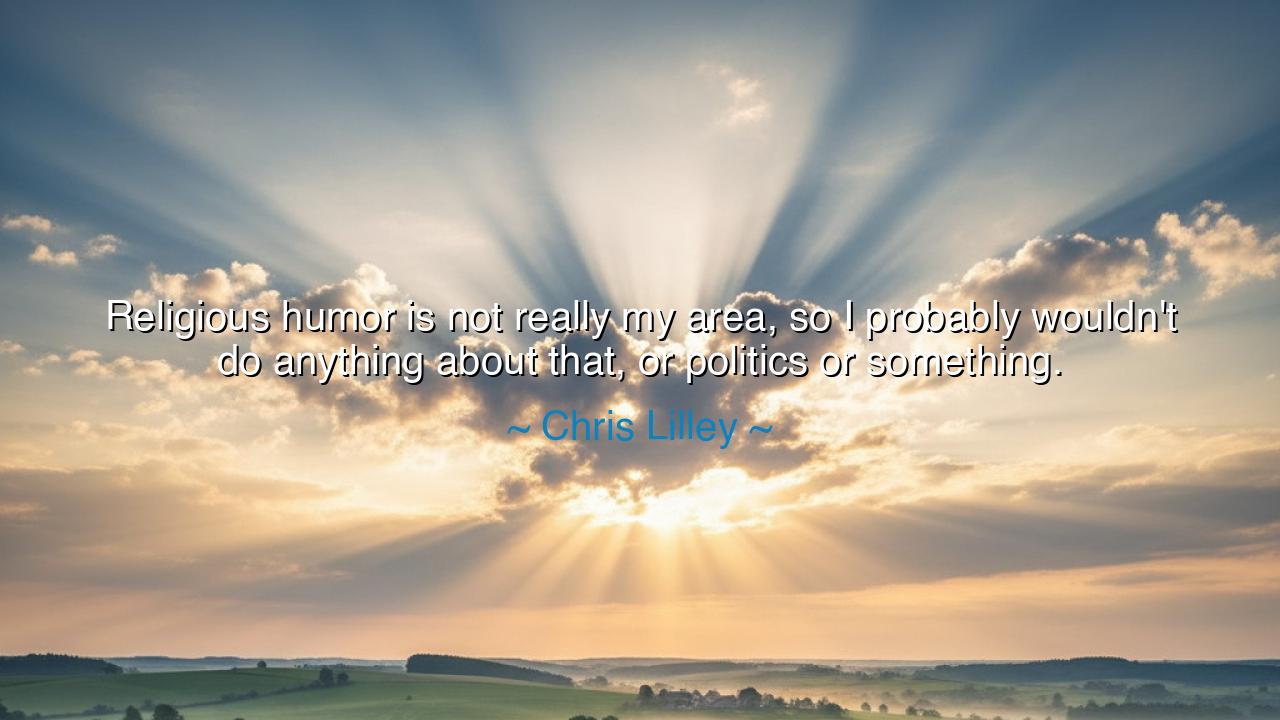
Religious humor is not really my area, so I probably wouldn't do
Religious humor is not really my area, so I probably wouldn't do anything about that, or politics or something.






When Chris Lilley said, “Religious humor is not really my area, so I probably wouldn’t do anything about that, or politics or something,” he spoke with the quiet wisdom of an artist who understands the limits of his own voice. In this humble acknowledgment lies a truth that is as old as the art of storytelling itself — that wisdom begins not in knowing everything, but in knowing where one’s understanding ends. Lilley, a creator known for his wit and satire, recognizes that not every field of humor, not every subject of life, is meant for every artist to explore. His restraint is not fear, but reverence — for both his craft and for the human experience it seeks to reflect.
The meaning of this quote lies in the virtue of discernment. Humor, like fire, can bring warmth or destruction depending on how it is wielded. In the hands of the careless, it can wound; in the hands of the wise, it can heal. Lilley’s words are a confession of artistic conscience — an understanding that certain realms, such as religion and politics, are woven too deeply into the fabric of identity to be handled lightly. To mock them without understanding is to risk tearing the threads that bind communities and hearts together. He chooses instead to work within the space where his humor can illuminate, not harm. Such humility is not weakness, but the highest form of creative strength.
The ancients too understood this balance between freedom and restraint. Socrates, who questioned all things, was careful never to mock the divine; he sought truth through dialogue, not derision. When he was condemned for impiety, it was not because he blasphemed, but because he dared to question without disrespect. Likewise, Aristophanes, the great comic playwright of Athens, often poked fun at society’s foolishness, yet knew the power of laughter to both unite and divide. His plays mocked philosophers and politicians alike, but they did so with an artistry that revealed truth without cruelty. Lilley’s approach echoes this ancient wisdom — that the artist’s responsibility is not only to entertain but to honor the boundaries of empathy and understanding.
To avoid religious humor is to acknowledge that faith, for many, is sacred ground — the soil of meaning, identity, and hope. To mock it carelessly is to trample that soil. The great thinkers of every age have known this. Consider Voltaire, who, though a satirist and critic of religion’s abuses, never attacked faith itself; rather, he fought hypocrisy and tyranny in the name of reason and compassion. His humor was sharp, but its blade was directed at injustice, not belief. Lilley’s decision to refrain from political or religious humor follows a similar moral intuition: that humor must aim not merely to provoke, but to enlighten.
There is also an element of self-awareness in Lilley’s words — the recognition that every artist has their sphere, their natural terrain. To attempt what one does not deeply understand is to risk dishonoring both the subject and oneself. The Roman poet Horace once wrote, “Know your own strength, and keep within it.” This was not a call for mediocrity, but for mastery. To stay true to one’s voice is to cultivate depth rather than scatter one’s talent across every field. In this sense, Lilley’s restraint becomes an act of artistic integrity. He does not chase controversy for fame; he pursues truth through what he knows best — human behavior, identity, and the quiet absurdities of everyday life.
The lesson to be taken from this is profound: not all silence is ignorance, and not all restraint is fear. There is a kind of wisdom that comes from knowing when to speak and when to remain silent. The loudest voices in the world are not always the wisest; often, it is those who choose their words carefully who carry the deepest understanding. To discern one’s boundaries — in art, in speech, in action — is to live with respect for both oneself and others. And from this respect arises harmony, both within and without.
So, my listener, take these words to heart: choose your humor, your voice, and your battles with care. Do not be quick to mock what you do not understand, nor to speak on matters beyond your sight. True courage is not in speaking everything, but in speaking rightly. The artist, the teacher, the thinker — all must learn this lesson if their words are to endure. For speech without wisdom is noise, but silence born of humility is power.
In the end, Chris Lilley’s words remind us that the art of creation is also the art of limitation. To know your domain, to respect the sacred, and to use laughter not as a weapon but as a bridge — this is the path of the wise. Humor, when guided by empathy, becomes illumination; when stripped of it, becomes cruelty. Therefore, let your wit be tempered by wisdom, your curiosity by compassion, and your voice by understanding. For in the ancient balance between what is said and what is left unsaid lies the soul of all true artistry — and the heart of all peace.






AAdministratorAdministrator
Welcome, honored guests. Please leave a comment, we will respond soon